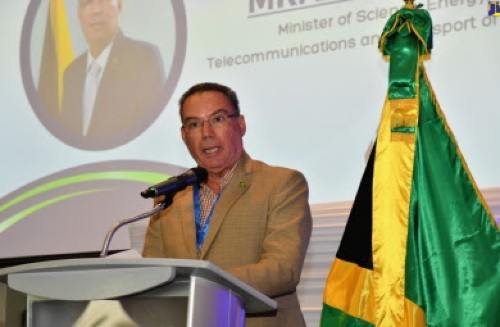KINGSTON, Jamaica – Jamaica's government says a bilateral aviation agreement signed with the Dominican Republic has fostered increased cultural exchange in tourism and increased commercial trade.
 Transport Minister, Daryl Vaz, speaking at the second Dominican Republic-Jamaica Business Forum on ThursdayScience, Energy, Telecommunications and Transport Minister, Daryl Vaz, told the second Dominican Republic-Jamaica Business Forum that the new initiatives are facilitating the creation of new business ventures and encouraging additional investments between both countries.
Transport Minister, Daryl Vaz, speaking at the second Dominican Republic-Jamaica Business Forum on ThursdayScience, Energy, Telecommunications and Transport Minister, Daryl Vaz, told the second Dominican Republic-Jamaica Business Forum that the new initiatives are facilitating the creation of new business ventures and encouraging additional investments between both countries.
“I am very confident that we will witness the signing of a crucial Memorandum of Cooperation (MOC) between the Airports Authority of Dominican Republic and Jamaica, which is expected to further strengthen bilateral ties.
“The MOC represents a collaborative venture aimed at facilitating exchanges, offering advisory support, and arranging visits from airports in Dominican Republic and Jamaica. Both countries will share best practices concerning airport management and core operations to further develop the airports in both countries,” Vaz added.
Vaz said he fully endorses the collaboration, noting that the Andrew Holness government recognises the crucial role aviation plays in the economy.
Vaz also disclosed that the Ministry has completed a new draft of the Jamaica National Energy Plthe island’s energy sector.
“We’re also reviewing the other policies, such as the renewable energy, bioenergy; carbon trading; nuclear energy; electricity; energy from waste and energy efficiency and conservation policies, to place the country on track to achieve its goals and to support the Government’s energy agenda.”
Vaz told the forum on Thursday that there has been impressive growth in Jamaica’s renewable-energy capacity, citing the increasingly prominent role of solar and wind power in the energy mix.
He said the transition to clean energy is not just an environmental requirement, it is also an economic opportunity, noting that by investing in renewable energy, the country can reduce its reliance on fossil fuels, create jobs and stimulate economic growth.
“The Electric Vehicle Policy, for example, is designed to promote the deployment of electric vehicles and contribute to the reduction of vehicle emissions towards supporting the goal of energy efficiency and a cleaner environment,” Vaz said.
He said that by promoting the switch from internal combustion engine to electric vehicles by 2030, the government is targeting private motor-vehicle users, public transport fleet owners and the Government of Jamaica’s fleet to make this crucially needed switch.
He said this is represented by the replenishment and modernisation of the Jamaica Urban Transit Company (JUTC) bus fleet, through the integration of electric and natural gas vehicles.
“This is a step in the right direction for the future of transport, which is a connecting mode for every sector. The replacement of the older vehicles with compressed natural gas buses will not only aid the JUTC fleet, but also reduce the discomfort that passengers are facing and provide another step towards a more sustainable transport sector as we transition to clean energy in Jamaica and reduce our carbon footprint,” Vaz stated.


